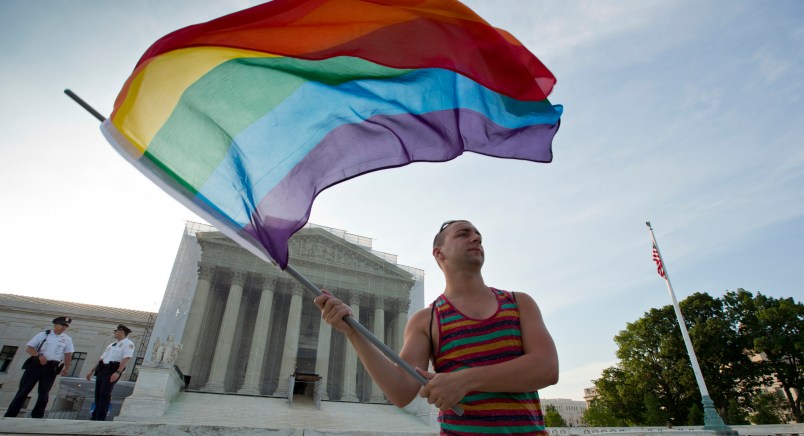Suddenly it’s a possibility that experts are contemplating: marriage equality could be the law of the land all across the United States within one year.
On Wednesday, Utah asked the Supreme Court to resolve its dispute with the 10th Circuit Court of Appeals which two weeks ago became the first U.S. circuit court to declare that same-sex couples have a constitutional right to marry.
Legal experts say the Supreme Court is likely to accept the case. With lawsuits piling up, and gay marriage on an undefeated legal streak since the Court axed the Defense of Marriage Act in 2013, the justices may plausibly hear the case in next term and decide it by June 2015.
“I think the Court will take the case. Since [U.S. v.] Windsor, all of the lower courts that have ruled have struck down laws prohibiting same sex marriages,” said Erwin Chemerinsky, the Dean of the University of California, Irvine School of Law. “Perhaps without a split in the lower courts, the Supreme Court will wait. My prediction, though, is that the Court knows the issue needs to be resolved and will take it.”
And if the Court does hear the case, all eyes will be on Justice Anthony Kennedy, not simply because he’s the traditional swing vote, but because he has written all three decisions in Supreme Court history that advanced gay rights.
“I also predict that the five justices in the majority in Windsor will be the majority to declare unconstitutional laws that deny marriage equality to gays and lesbians,” Chemerinsky said.
Jonathan Adler, a professor at Case Western Reserve University School of Law who’s respected by conservative legal luminaries, also suggested Kennedy may continue his gay rights streak.
“I would think the Court is likely to take a case in the Fall, though they may wait to see if a real split emerges. Whenever they do take such a case I would not be surprised to see Kennedy cast the deciding vote in favor of gay marriage,” Adler said in an email.
In the DOMA case, Kennedy said the federal government may not deny equal
benefits to married same-sex couples but didn’t address the question of
whether state bans on gay marriage were constitutional. Lower court judges widely cited the reasoning in Kennedy’s decision, concluding that laws against marriage equality — like DOMA — are motivated by a desire to harm gays and lesbians and thus impermissible under the Constitution’s equal protection clause.
The Supreme Court typically resolves national disputes on major issues, especially when the lower courts split. In this case, there may not be a split; if so the Court could choose to wait, experts said. But eventually the widespread view among court watchers is that the lawsuits will keep coming and, in order to avoid chaos and confusion while rulings are on hold pending appeal, the Supreme Court will opt to settle the matter.
Currently 31 states prohibit same-sex marriage, a number that has been dropping.
At least four justices have to vote to take a case in order for the Supreme Court to do so, which could happen as early as this fall.







Hark! What are those tiny little pops that I do hear?
'Tis the sweet, sweet sound of Teabagger heads, exploding in a surge of impotent derp.
I think equality will win, too, and it will come sooner rather than later.
But, all you straight white males out there: Try to imagine what it’s like sitting back waiting for a small number of men to decide whether you have equality or not. We gays and lesbians know what that’s like, as do women, and as do minorities.
Can’t live in a world with gay marriage??
BON VOYAGE!
http://www.goddiscussion.com/wp-content/uploads/2013/05/venner.jpg
Silly, silly man.
Most of them evidently have conveniently-placed holes to relieve the pressure, otherwise their brains would’ve exploded long ago.
Anyway, to be fair, it’s not just the TPers in this context. Until relatively recently, a large number of supposedly-liberal-ish Dems opposed marriage equality, or at least didn’t have the courage to publicly support it. That included President Obama, and DOMA itself was signed by President Clinton.
The Democratic Party is all “We Are Family” now, but it had to be dragged to that point.